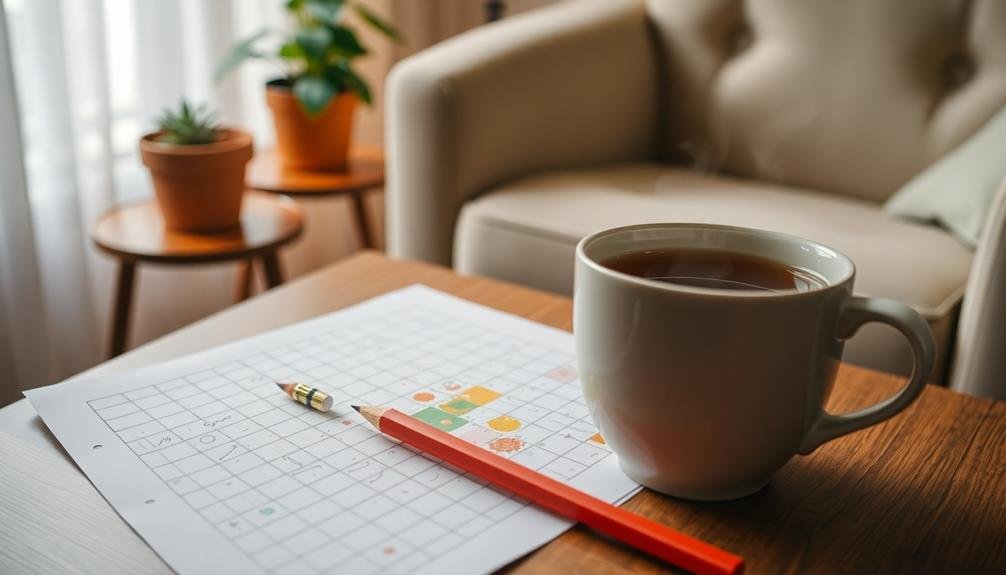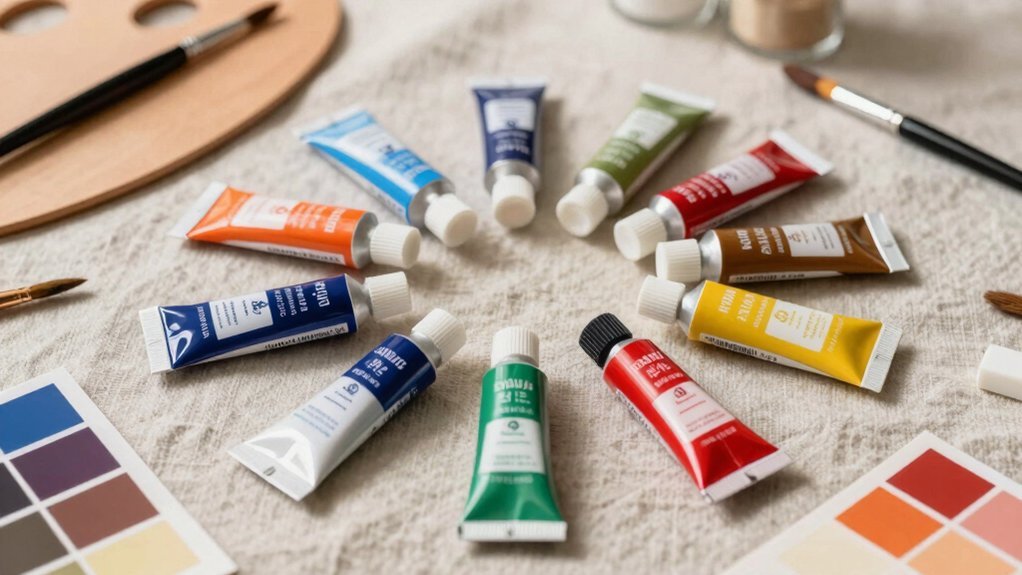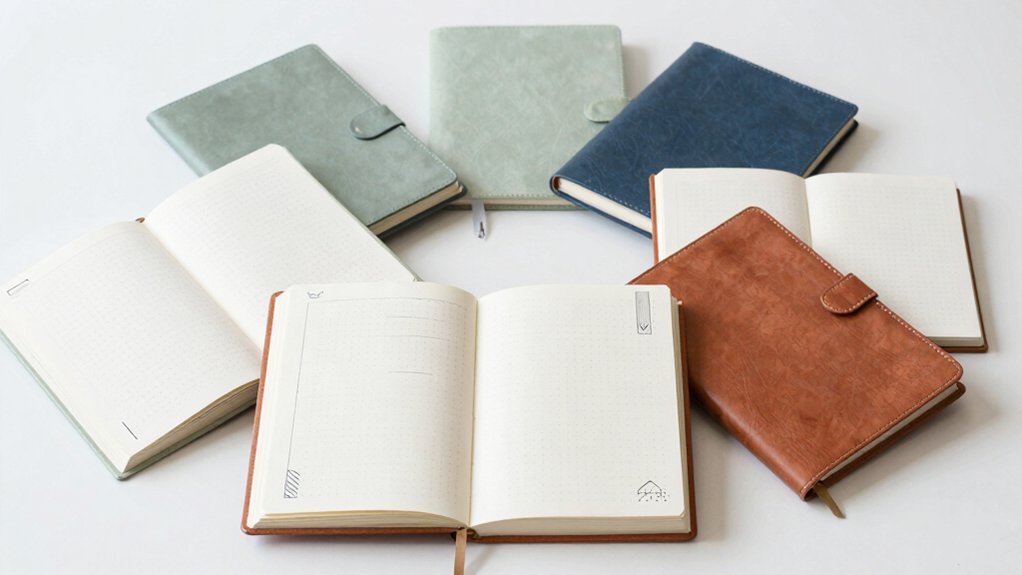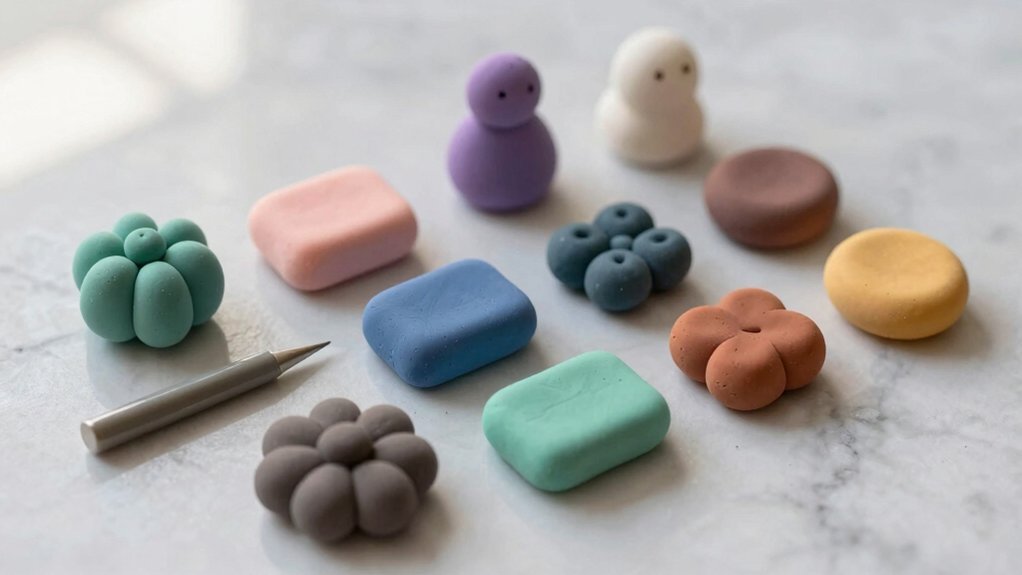Seven relaxing puzzle hobbies can help soothe anxious minds while providing mental stimulation. Jigsaw puzzles offer a calming experience through image assembly. Sudoku engages logic skills with number grids. Crossword puzzles expand vocabulary and challenge knowledge. Rubik's Cube presents a rewarding challenge through solving techniques. Logic grid puzzles enhance critical thinking with deductive reasoning. Tangrams develop spatial awareness using seven flat shapes. Paint by Numbers provides a soothing entry into painting. These hobbies cater to various skill levels and can be enjoyed alone or with others. Discover how each puzzle type can benefit your cognitive function and emotional well-being.
Jigsaw Puzzles

One of the most popular and enduring puzzle hobbies, jigsaw puzzles offer a calming yet engaging experience. You'll find yourself immersed in the challenge of piecing together a fragmented image, which can range from simple landscapes to complex, multi-thousand-piece masterpieces.
To start, you'll want to sort the pieces by edge and color. This initial organization helps create a framework for your puzzle-solving strategy. As you work, you'll develop a keen eye for shapes and patterns, improving your visual perception and problem-solving skills.
Jigsaw puzzles are excellent for stress relief. The repetitive nature of fitting pieces together can induce a meditative state, helping you focus on the present moment and forget your worries. You'll experience a sense of accomplishment with each piece placed correctly, boosting your mood and confidence.
These puzzles also offer flexibility regarding difficulty and time commitment. You can choose puzzles that match your skill level and available time, making them suitable for quick sessions or long, leisurely afternoons.
Whether you prefer working alone or collaborating with friends and family, jigsaw puzzles provide a versatile and satisfying hobby for anxious minds.
Sudoku
Moving from physical puzzles to numerical challenges, Sudoku offers a different kind of mental workout. You'll find yourself engrossed in a 9×9 grid, aiming to fill each row, column, and 3×3 box with numbers 1 through 9, without repetition. It's a game of logic and deduction that can be both calming and invigorating for your mind.
Sudoku's popularity has exploded since its introduction to the wider world in the mid-2000s. You can find these puzzles in newspapers, dedicated books, and countless mobile apps. They come in various difficulty levels, from beginner to expert, ensuring there's always a challenge suited to your skill level.
To improve your Sudoku-solving skills:
- Start with easier puzzles and gradually increase difficulty
- Learn common solving techniques like "single candidate" and "pairs"
- Practice regularly to build pattern recognition and speed
As you become more proficient, you'll notice your concentration and problem-solving abilities improving.
Sudoku can be a meditative experience, allowing you to focus solely on numbers and logic, potentially reducing anxiety and stress. It's a portable hobby you can enjoy anywhere, making it perfect for quick mental breaks throughout your day.
Crossword Puzzles

Crossword puzzles offer you a fun way to expand your vocabulary while giving your brain a workout.
You'll find these word games challenge your knowledge and problem-solving skills, making them an excellent mental exercise.
Vocabulary-Building Mental Exercise
Among the many relaxing puzzle hobbies, crossword puzzles stand out as an excellent vocabulary-building mental exercise. As you tackle clues and fill in the grid, you're constantly expanding your knowledge of words, their meanings, and their usage. This mental workout not only improves your language skills but also keeps your mind sharp and agile.
Crossword puzzles offer a unique challenge that combines problem-solving with linguistic prowess. You'll find yourself recalling obscure words, deciphering wordplay, and making connections between seemingly unrelated concepts. This process stimulates your brain, enhancing cognitive function and memory retention.
To make the most of crossword puzzles as a vocabulary-building exercise:
- Start with easier puzzles and gradually increase difficulty
- Use a dictionary or thesaurus to look up unfamiliar words
- Pay attention to recurring words and phrases in crosswords
Daily Ritual for Focus
Three key benefits make crossword puzzles an ideal daily ritual for improving focus.
First, they provide a structured mental workout that trains your brain to concentrate for extended periods. By dedicating time each day to solve a crossword, you're developing a habit of sustained attention that can carry over into other areas of your life.
Second, crosswords offer a clear start and finish point, giving you a sense of accomplishment and closure. This daily achievement can boost your confidence and motivation, making it easier to tackle other tasks that require focus.
Lastly, the variety of clues in crosswords engages different parts of your brain, improving overall cognitive function. You'll find yourself switching between language skills, general knowledge, and problem-solving abilities, which keeps your mind agile and adaptable.
To make crosswords a daily ritual, choose a consistent time and place. Perhaps it's with your morning coffee or before bed.
Start with easier puzzles and gradually increase difficulty. Don't rush; the goal is to enjoy the process while sharpening your focus. With regular practice, you'll likely notice improvements in your concentration and mental clarity throughout your day.
Rubik's Cube
You'll find solving a Rubik's Cube both challenging and rewarding as you learn various techniques and algorithms.
As you practice, you'll discover methods to solve the puzzle more efficiently, from beginner strategies to advanced move sequences.
If you're up for a real test, you can try your hand at speed cubing challenges, where enthusiasts compete to solve the cube in mere seconds.
Solving Techniques and Algorithms
Solving a Rubik's Cube can seem intimidating at first, but with the right techniques and algorithms, you'll be able to conquer this colorful puzzle. Start by learning the basic notation for cube moves, such as R (right), L (left), U (up), and D (down).
Then, focus on mastering the layer-by-layer method, which involves solving the cube one layer at a time. Begin with the white cross on the first layer, followed by the white corners. Next, solve the middle layer edges, and finally tackle the last layer.
For the last layer, you'll need to learn a few essential algorithms:
- The F2L (First Two Layers) algorithm
- OLL (Orientation of Last Layer) algorithm
- PLL (Permutation of Last Layer) algorithm
As you practice, you'll develop muscle memory for these algorithms, allowing you to solve the cube more quickly and efficiently.
Don't get discouraged if it takes time to master; consistency is key. Remember, solving a Rubik's Cube isn't just about speed—it's a great way to improve your spatial awareness, problem-solving skills, and hand-eye coordination while providing a relaxing and satisfying hobby.
Speed Cubing Challenges
For many cubing enthusiasts, mastering the basic solve is just the beginning. Speed cubing challenges take this puzzle hobby to a whole new level, offering excitement and a chance to test your skills against the clock and other cubers.
You'll find various speed cubing events, each with its own set of rules and challenges. The most common is the 3x3x3 cube, where you'll aim to solve the puzzle as quickly as possible. Other events include 2x2x2, 4x4x4, and even solving cubes blindfolded or one-handed.
To excel in speed cubing, you'll need to learn advanced solving techniques like CFOP, Roux, or ZZ. These methods involve memorizing algorithms and recognizing patterns to reduce your solving time.
Practice is vital; many speed cubers dedicate hours to perfecting their finger tricks and muscle memory.
You can participate in official competitions organized by the World Cube Association or join online communities to compete virtually. As you improve, you'll track your personal bests and maybe even set records.
Logic Grid Puzzles

Logic grid puzzles offer a challenging yet rewarding mental workout for puzzle enthusiasts. These puzzles require you to use deductive reasoning and systematic elimination to solve a complex set of clues and determine the correct relationships between various elements.
You'll find yourself immersed in a world of logical thinking as you work through each clue, filling in the grid and uncovering the hidden connections.
To excel at logic grid puzzles, you'll need to:
- Read the clues carefully and identify key information
- Use the grid efficiently, marking both positive and negative relationships
- Apply advanced techniques like cross-referencing and inferencing
As you progress, you'll discover that logic grid puzzles come in various difficulty levels and themes. From simple 3×3 grids to complex 5×5 or larger puzzles, there's always a new challenge waiting.
You can find these puzzles in puzzle books, online platforms, or even create your own. By regularly engaging with logic grid puzzles, you'll sharpen your analytical skills, improve your attention to detail, and boost your overall cognitive abilities.
It's a relaxing yet stimulating hobby that can provide hours of entertainment while keeping your mind sharp and focused.
Tangrams
Tangrams, an ancient Chinese puzzle game, offer a delightful blend of geometry and creativity. This puzzle consists of seven flat shapes, called tans, which are used to form specific silhouettes. You'll find five triangles of various sizes, one square, and one parallelogram in a typical set.
To solve a tangram puzzle, you'll need to arrange all seven pieces to match a given outline or shape. The challenge lies in using every piece without overlapping. You'll often find yourself rotating, flipping, and rearranging the tans until they fit perfectly.
As you progress, you'll encounter increasingly complex shapes, from simple geometric forms to intricate figures of animals, people, and objects.
Tangrams are excellent for developing spatial awareness, problem-solving skills, and patience. They're portable, making them ideal for travel or quick mental breaks. You can find tangram puzzles in books, apps, or physical sets.
As you become more adept, you might even create your own designs. This versatile puzzle game offers endless possibilities for relaxation and mental stimulation, making it a perfect hobby for those seeking a calming yet engaging pastime.
Paint by Numbers

Paint by Numbers offers a soothing and accessible entry into the world of painting. You'll find pre-printed canvases with numbered sections corresponding to specific paint colors. This system allows you to create beautiful artwork without worrying about composition or color mixing. As you fill in each section, you'll experience a sense of accomplishment and relaxation.
To get started with Paint by Numbers, follow these steps:
- Choose a kit that appeals to you, considering difficulty level and subject matter.
- Set up a comfortable workspace with good lighting and all necessary supplies.
- Begin painting, working from top to bottom to avoid smudging.
You'll find that Paint by Numbers helps improve your focus and patience as you concentrate on each small section. It's an excellent way to unwind after a stressful day or occupy your mind during anxious moments.
As you progress, you'll develop a better understanding of color relationships and brush control, which can translate into freehand painting skills.
Many enthusiasts frame their completed Paint by Numbers pieces, creating personalized decor for their homes or thoughtful gifts for loved ones. This hobby offers a perfect balance of creativity and structure, making it an ideal choice for those seeking a calming yet rewarding pastime.
Frequently Asked Questions
How Can Puzzle Hobbies Improve Mental Health Beyond Reducing Anxiety?
Puzzle hobbies can boost your cognitive skills, enhancing memory and problem-solving abilities. They'll improve your focus, increase your attention to detail, and provide a sense of achievement. You'll also enjoy social connections when sharing this hobby with others.
Are There Any Potential Drawbacks to Engaging in Puzzle Hobbies Regularly?
You might become overly focused on puzzles, neglecting other activities. They can be time-consuming and potentially addictive. You're also at risk of eye strain or repetitive stress injuries if you don't take breaks. Don't forget to maintain balance.
What Age Groups Benefit Most From Relaxing Puzzle Hobbies?
You'll find puzzle hobbies benefit all age groups. They're especially valuable for children developing cognitive skills, adults seeking stress relief, and seniors maintaining mental acuity. Don't hesitate to start, regardless of your age – you'll reap the rewards.
Can Puzzle Hobbies Be Effectively Used in Group Therapy Settings?
Yes, you'll find puzzle hobbies can be highly effective in group therapy settings. They'll promote teamwork, communication, and problem-solving skills. You'll see participants bonding as they work together, reducing anxiety and fostering a supportive environment.
How Do Digital Versions of Puzzles Compare to Traditional Physical Formats?
You'll find digital puzzles offer convenience and instant access, but they lack the tactile experience of physical formats. They're often more interactive and customizable, yet some argue they're less relaxing due to screen time concerns.
In Summary
You've now discovered seven engaging puzzle hobbies to calm your anxious mind. Whether you're piecing together a jigsaw, solving a Sudoku, or tackling a crossword, these activities offer a soothing escape. Don't forget to try your hand at the Rubik's Cube, logic grid puzzles, tangrams, and paint by numbers too. By focusing on these relaxing pursuits, you'll give your brain a break from worry and stress. So pick up a puzzle and let your mind unwind.





Leave a Reply